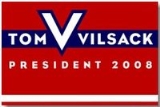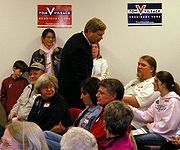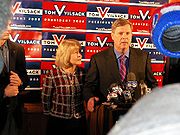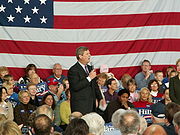
Tom Vilsack presidential campaign, 2008
Encyclopedia
After being considered as a potential Vice Presidential candidate
for Senator
John Kerry
in the 2004 presidential election
, former Iowa Governor Tom Vilsack
began a campaign for the Democratic Party
's 2008
nomination for President of the United States
.
On November 30, 2006, he became the second Democratic candidate to officially announce a presidential run. His short-lived campaign was focused on his home state of Iowa
but suffered low standing in national polls and a lack of name recognition. During the campaign, he emphasized the War in Iraq and his plan for ending it.
His run concluded on February 23, 2007, before any debates or primaries, due to funding shortfalls. He endorsed Senator Hillary Clinton after his exit, but shifted to Barack Obama
after her withdrawal.
and announced that he had been "put[ting] together the building blocks needed to run a successful national presidential campaign." He made his formal announcement on November 30.
. He listed the themes of his campaign as energy independence, national security, and the economy. The candidate promised change in government by means of reduced partisanship and decried the Bush Administration
as one "whose first impulse is to divide and to conquer." Vilsack acknowledged his underdog status, given his low profile outside Iowa, which hampered fundraising.
In December, Vilsack embarked on a campaign tour beginning in his hometown of Pittsburgh
. While there, he addressed a local Democratic Committee, reminiscing about his childhood and how his adopted mother overcame alcoholism
. He also discussed his policy on the Iraq War, advocating devolving control to the Iraqi government: "It's their country, it's their future and they should be willing to fight for it and they certainly should be willing to die for it." He returned to Iowa for a fundraiser later in the week.
 In mid-December 2006 Vilsack was interviewed by two major magazines. In U.S. News and World Report, he explained why he decided against forming an exploratory committee
In mid-December 2006 Vilsack was interviewed by two major magazines. In U.S. News and World Report, he explained why he decided against forming an exploratory committee
like many of his Democratic rivals, on the principle that he had "to get to work." He linked the issue of energy security to global warming and national security. He advocated moving American troops from southern and central Iraq to the north, and further commented that political reconciliation must be refocused on "building local governance" rather than spending "all the time on the national government." In an interview with Rolling Stone
, he made a distinction between "experience and judgment" and emphasized the importance of the latter. Vilsack attacked Republican candidate John McCain's planned Iraq troop surge as "making a big mistake bigger", and denied that the military had the resources to execute it. In discounting the importance of name recognition, he said "people don’t have to remember my name, they only have to remember the first letter which is V. It stands for vision, it stands for victory, it stands for Vilsack." He also expressed his satisfaction with frontrunner Hillary Clinton, calling himself "a big fan."
In January, Vilsack toured New Hampshire
, site of the first primary. There he met with middle school students, with whom he discussed his plans for rebuilding Iraq. Dismissing his Democratic opponents' calls for caps on American troops in the nation, Vilsack advocated a troop withdrawal. He also talked about Iraq with employees of the Granite State Independent Living Group, blaming the costs of rebuilding for the lack of public funds available for domestic projects. In Iowa later in the month, Vilsack reiterated his opposition to troop caps, likening them to "staying the course". He stated that troop capping "reflects the continuation of a failed policy" and that America "ought to be...aggressively redeploying troops out of Iraq."
 On February 15, before an appearance on the Tonight Show with Jay Leno
On February 15, before an appearance on the Tonight Show with Jay Leno
, Vilsack visited the Commonwealth Club
in San Francisco where he gave a speech about energy. He explained that his campaign remained carbon neutral
through the purchase of carbon credits. On the Tonight Show, Vilsack joked about his relative obscurity. He remarked that he was okay with Leno making jokes about him, because "when you are just below the margin of error in polls, anything anybody says about you is important."
Vilsack officially withdrew from the race on February 23, stating that the crowded field of Democratic candidates made it impossible for him to raise enough money to continue his campaign. In explaining his withdrawal, he stated that he "came up against something for the first time in [his] life that hard work and effort couldn’t overcome." Bemoaning an electoral process that he saw as dominated by fundraising, he left the race proclaiming "it is money and only money that is the reason we are leaving today." Vilsack raised $1.1 million during his run and left the race with $396,000 on hand.
A Rasmussen report
published December 18, 2006 that polled voters on their preferences in a variety of hypothetical presidential matchups showed that Vilsack was preferred to former Arkansas
governor Mike Huckabee
by a margin of 37% to 29%, but trailed former New York City
Mayor
Rudy Guliani 56% to 28%." A similar poll, published in February 2007 before Vilsack's withdrawal, found that he trailed Republican Senator John McCain 50% to 22%. In a separate poll by Rasmussen, Vilsack was viewed favorably by 21% of the electorate and unfavorably by 21%. 58% of voters did not have enough information about Vilsack to have an opinion. 19% of respondents considered Vilsack a moderate, 9% considered him a liberal
and 7% considered him a conservative. 65% could not describe his political stands.
 After withdrawing from the race, Vilsack endorsed Senator Hillary Clinton for the presidency on March 25, 2007. He hoped to build momentum for her in Iowa. The former Governor identified Clinton as the candidate with "the best ideas, the most energy, and the values and vision to lead our country." Shortly after the endorsement, Clinton named Vilsack's wife Christie as the co-chairman of her campaign in Iowa. The Clinton campaign announced they would help Vilsack pay off his campaign's $400,000 debt. Vilsack campaigned for Clinton nationwide as national campaign co-chairman, and focused on helping her win the Iowa caucuses. Despite his efforts, Clinton finished third in the caucuses behind Barack Obama and John Edwards
After withdrawing from the race, Vilsack endorsed Senator Hillary Clinton for the presidency on March 25, 2007. He hoped to build momentum for her in Iowa. The former Governor identified Clinton as the candidate with "the best ideas, the most energy, and the values and vision to lead our country." Shortly after the endorsement, Clinton named Vilsack's wife Christie as the co-chairman of her campaign in Iowa. The Clinton campaign announced they would help Vilsack pay off his campaign's $400,000 debt. Vilsack campaigned for Clinton nationwide as national campaign co-chairman, and focused on helping her win the Iowa caucuses. Despite his efforts, Clinton finished third in the caucuses behind Barack Obama and John Edwards
Following Clinton's withdrawal, Vilsack endorsed Obama for the presidency on July 15, 2008. He labeled Obama as the "only candidate" for voters "against partisanship" to change "the tone in Washington"
Vilsack was later nominated by President Obama to serve as the United States Secretary of Agriculture
in his administration. He was confirmed for the post by the Senate
on Inauguration Day.
Running mate
A running mate is a person running together with another person on a joint ticket during an election. The term is most often used in reference to the person in the subordinate position but can also properly be used when referring to both candidates, such as "Michael Dukakis and Lloyd Bentsen were...
for Senator
United States Senate
The United States Senate is the upper house of the bicameral legislature of the United States, and together with the United States House of Representatives comprises the United States Congress. The composition and powers of the Senate are established in Article One of the U.S. Constitution. Each...
John Kerry
John Kerry
John Forbes Kerry is the senior United States Senator from Massachusetts, the 10th most senior U.S. Senator and chairman of the Senate Foreign Relations Committee. He was the presidential nominee of the Democratic Party in the 2004 presidential election, but lost to former President George W...
in the 2004 presidential election
United States presidential election, 2004
The United States presidential election of 2004 was the United States' 55th quadrennial presidential election. It was held on Tuesday, November 2, 2004. Republican Party candidate and incumbent President George W. Bush defeated Democratic Party candidate John Kerry, the then-junior U.S. Senator...
, former Iowa Governor Tom Vilsack
Tom Vilsack
Thomas James "Tom" Vilsack is an American politician, a member of the Democratic Party, and presently the U.S. Secretary of Agriculture. He served as the 40th Governor of the state of Iowa. He was first elected in 1998 and re-elected to a second four-year term in 2002...
began a campaign for the Democratic Party
Democratic Party (United States)
The Democratic Party is one of two major contemporary political parties in the United States, along with the Republican Party. The party's socially liberal and progressive platform is largely considered center-left in the U.S. political spectrum. The party has the lengthiest record of continuous...
's 2008
United States presidential election, 2008
The United States presidential election of 2008 was the 56th quadrennial presidential election. It was held on November 4, 2008. Democrat Barack Obama, then the junior United States Senator from Illinois, defeated Republican John McCain, the senior U.S. Senator from Arizona. Obama received 365...
nomination for President of the United States
President of the United States
The President of the United States of America is the head of state and head of government of the United States. The president leads the executive branch of the federal government and is the commander-in-chief of the United States Armed Forces....
.
On November 30, 2006, he became the second Democratic candidate to officially announce a presidential run. His short-lived campaign was focused on his home state of Iowa
Iowa
Iowa is a state located in the Midwestern United States, an area often referred to as the "American Heartland". It derives its name from the Ioway people, one of the many American Indian tribes that occupied the state at the time of European exploration. Iowa was a part of the French colony of New...
but suffered low standing in national polls and a lack of name recognition. During the campaign, he emphasized the War in Iraq and his plan for ending it.
His run concluded on February 23, 2007, before any debates or primaries, due to funding shortfalls. He endorsed Senator Hillary Clinton after his exit, but shifted to Barack Obama
Barack Obama
Barack Hussein Obama II is the 44th and current President of the United States. He is the first African American to hold the office. Obama previously served as a United States Senator from Illinois, from January 2005 until he resigned following his victory in the 2008 presidential election.Born in...
after her withdrawal.
Early stages
Near the end of his eight years as Governor of Iowa, Vilsack, as head of the centrist Democratic Leadership Council, campaigned for Democratic gubernatorial candidates across the nation. While on the campaign trail he gauged support for a possible presidential run. Vilsack was inspired by the results of the 2006 mid-term elections, and proclaimed that "Americans sent a clear message" that "they want leaders who share their values, understand their needs and respect their intelligence" and that that is what he would "intend to do as president". On November 9, Vilsack filed with the FECFEC
FEC is an acronym which may refer to:*Foreign exchange certificate, a type of currency*Forward error correction, a system of error control for data transmission*Family entertainment center, a small amusement park or indoor equivalent intended for family fun...
and announced that he had been "put[ting] together the building blocks needed to run a successful national presidential campaign." He made his formal announcement on November 30.
Campaign developments
Vilsack made his announcement in Mount Pleasant, IowaMount Pleasant, Iowa
Mount Pleasant is a city in and the county seat of Henry County, Iowa, in the United States. The population was 8,668 in the 2010 census, a decline from 8,751 in the 2000 census. It was founded in 1835 by pioneer Presley Saunders.- History :...
. He listed the themes of his campaign as energy independence, national security, and the economy. The candidate promised change in government by means of reduced partisanship and decried the Bush Administration
George W. Bush administration
The presidency of George W. Bush began on January 20, 2001, when he was inaugurated as the 43rd President of the United States of America. The oldest son of former president George H. W. Bush, George W...
as one "whose first impulse is to divide and to conquer." Vilsack acknowledged his underdog status, given his low profile outside Iowa, which hampered fundraising.
In December, Vilsack embarked on a campaign tour beginning in his hometown of Pittsburgh
Pittsburgh, Pennsylvania
Pittsburgh is the second-largest city in the US Commonwealth of Pennsylvania and the county seat of Allegheny County. Regionally, it anchors the largest urban area of Appalachia and the Ohio River Valley, and nationally, it is the 22nd-largest urban area in the United States...
. While there, he addressed a local Democratic Committee, reminiscing about his childhood and how his adopted mother overcame alcoholism
Alcoholism
Alcoholism is a broad term for problems with alcohol, and is generally used to mean compulsive and uncontrolled consumption of alcoholic beverages, usually to the detriment of the drinker's health, personal relationships, and social standing...
. He also discussed his policy on the Iraq War, advocating devolving control to the Iraqi government: "It's their country, it's their future and they should be willing to fight for it and they certainly should be willing to die for it." He returned to Iowa for a fundraiser later in the week.

Exploratory Committee
In the election politics of the United States, an exploratory committee is an organization established to help determine whether a potential candidate should run for an elected office. They are most often cited in reference to United States Presidential hopefuls, prior to the primaries.Exploratory...
like many of his Democratic rivals, on the principle that he had "to get to work." He linked the issue of energy security to global warming and national security. He advocated moving American troops from southern and central Iraq to the north, and further commented that political reconciliation must be refocused on "building local governance" rather than spending "all the time on the national government." In an interview with Rolling Stone
Rolling Stone
Rolling Stone is a US-based magazine devoted to music, liberal politics, and popular culture that is published every two weeks. Rolling Stone was founded in San Francisco in 1967 by Jann Wenner and music critic Ralph J...
, he made a distinction between "experience and judgment" and emphasized the importance of the latter. Vilsack attacked Republican candidate John McCain's planned Iraq troop surge as "making a big mistake bigger", and denied that the military had the resources to execute it. In discounting the importance of name recognition, he said "people don’t have to remember my name, they only have to remember the first letter which is V. It stands for vision, it stands for victory, it stands for Vilsack." He also expressed his satisfaction with frontrunner Hillary Clinton, calling himself "a big fan."
In January, Vilsack toured New Hampshire
New Hampshire
New Hampshire is a state in the New England region of the northeastern United States of America. The state was named after the southern English county of Hampshire. It is bordered by Massachusetts to the south, Vermont to the west, Maine and the Atlantic Ocean to the east, and the Canadian...
, site of the first primary. There he met with middle school students, with whom he discussed his plans for rebuilding Iraq. Dismissing his Democratic opponents' calls for caps on American troops in the nation, Vilsack advocated a troop withdrawal. He also talked about Iraq with employees of the Granite State Independent Living Group, blaming the costs of rebuilding for the lack of public funds available for domestic projects. In Iowa later in the month, Vilsack reiterated his opposition to troop caps, likening them to "staying the course". He stated that troop capping "reflects the continuation of a failed policy" and that America "ought to be...aggressively redeploying troops out of Iraq."

Jay Leno
James Douglas Muir "Jay" Leno is an American stand-up comedian and television host.From 1992 to 2009, Leno was the host of NBC's The Tonight Show with Jay Leno. Beginning in September 2009, Leno started a primetime talk show, titled The Jay Leno Show, which aired weeknights at 10:00 p.m. ,...
, Vilsack visited the Commonwealth Club
Commonwealth Club of California
The Commonwealth Club of California is a non-profit, non-partisan educational organization based in Northern California. Founded in 1903, it is the oldest and largest public affairs forum in the United States...
in San Francisco where he gave a speech about energy. He explained that his campaign remained carbon neutral
Carbon neutral
Carbon neutrality, or having a net zero carbon footprint, refers to achieving net zero carbon emissions by balancing a measured amount of carbon released with an equivalent amount sequestered or offset, or buying enough carbon credits to make up the difference...
through the purchase of carbon credits. On the Tonight Show, Vilsack joked about his relative obscurity. He remarked that he was okay with Leno making jokes about him, because "when you are just below the margin of error in polls, anything anybody says about you is important."
Vilsack officially withdrew from the race on February 23, stating that the crowded field of Democratic candidates made it impossible for him to raise enough money to continue his campaign. In explaining his withdrawal, he stated that he "came up against something for the first time in [his] life that hard work and effort couldn’t overcome." Bemoaning an electoral process that he saw as dominated by fundraising, he left the race proclaiming "it is money and only money that is the reason we are leaving today." Vilsack raised $1.1 million during his run and left the race with $396,000 on hand.
Polling
In the race for the Democratic nomination, Gallup polls placed Vilsack at 1% support in November and December 2006. This fell to 0% on January 7, where it remained until his withdrawal in February.A Rasmussen report
Rasmussen Reports
Rasmussen Reports is an American media company that publishes and distributes information based on public opinion polling. Founded by pollster Scott Rasmussen in 2003, the company updates daily indexes including the President's job approval rating, and provides public opinion data, analysis, and...
published December 18, 2006 that polled voters on their preferences in a variety of hypothetical presidential matchups showed that Vilsack was preferred to former Arkansas
Arkansas
Arkansas is a state located in the southern region of the United States. Its name is an Algonquian name of the Quapaw Indians. Arkansas shares borders with six states , and its eastern border is largely defined by the Mississippi River...
governor Mike Huckabee
Mike Huckabee
Michael "Mike" Dale Huckabee is an American politician who served as the 44th Governor of Arkansas from 1996 to 2007. He was a candidate in the 2008 United States Republican presidential primaries, finishing second in delegate count and third in both popular vote and number of states won . He won...
by a margin of 37% to 29%, but trailed former New York City
New York City
New York is the most populous city in the United States and the center of the New York Metropolitan Area, one of the most populous metropolitan areas in the world. New York exerts a significant impact upon global commerce, finance, media, art, fashion, research, technology, education, and...
Mayor
Mayor of New York City
The Mayor of the City of New York is head of the executive branch of New York City's government. The mayor's office administers all city services, public property, police and fire protection, most public agencies, and enforces all city and state laws within New York City.The budget overseen by the...
Rudy Guliani 56% to 28%." A similar poll, published in February 2007 before Vilsack's withdrawal, found that he trailed Republican Senator John McCain 50% to 22%. In a separate poll by Rasmussen, Vilsack was viewed favorably by 21% of the electorate and unfavorably by 21%. 58% of voters did not have enough information about Vilsack to have an opinion. 19% of respondents considered Vilsack a moderate, 9% considered him a liberal
Liberalism in the United States
Liberalism in the United States is a broad political philosophy centered on the unalienable rights of the individual. The fundamental liberal ideals of freedom of speech, freedom of the press, freedom of religion for all belief systems, and the separation of church and state, right to due process...
and 7% considered him a conservative. 65% could not describe his political stands.
Aftermath

John Edwards
Johnny Reid "John" Edwards is an American politician, who served as a U.S. Senator from North Carolina. He was the Democratic nominee for Vice President in 2004, and was a candidate for the Democratic presidential nomination in 2004 and 2008.He defeated incumbent Republican Lauch Faircloth in...
Following Clinton's withdrawal, Vilsack endorsed Obama for the presidency on July 15, 2008. He labeled Obama as the "only candidate" for voters "against partisanship" to change "the tone in Washington"
Vilsack was later nominated by President Obama to serve as the United States Secretary of Agriculture
United States Secretary of Agriculture
The United States Secretary of Agriculture is the head of the United States Department of Agriculture. The current secretary is Tom Vilsack, who was confirmed by the U.S. Senate on 20 January 2009. The position carries similar responsibilities to those of agriculture ministers in other...
in his administration. He was confirmed for the post by the Senate
United States Senate
The United States Senate is the upper house of the bicameral legislature of the United States, and together with the United States House of Representatives comprises the United States Congress. The composition and powers of the Senate are established in Article One of the U.S. Constitution. Each...
on Inauguration Day.

